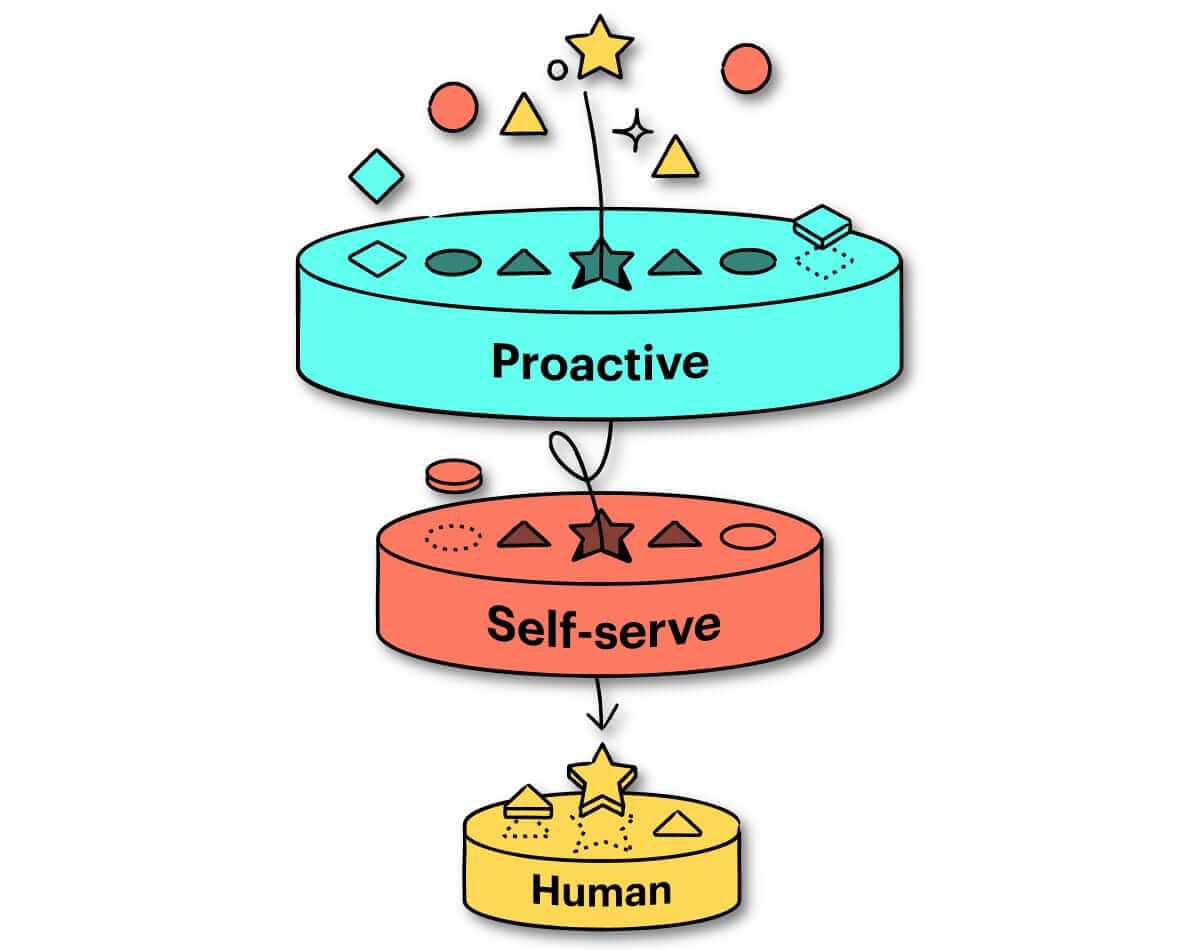
How support leaders can empower their teams to satisfy, delight, and retain customers
Main illustration: Jarred Briggs
As a support leader, you already know how important it is to take care of your customers – but it’s just as important to take care of your support team.
The rise of automation and bots has led to some seismic changes in the career landscape for many support professionals and support leaders have had to rethink the role and structure of their teams. Being able to leverage both automated and human support has led to some incredible advancements, allowing companies to scale their support and deliver personalized experiences more efficiently than ever before.
As a result, human support is more critical than ever. And with a greater impact on your customer satisfaction – and ultimately your company’s bottom line – it’s increasingly important to invest in your human support team as a real strategic lever in your business.
Here’s why human support is so crucial for any customer-centric organization, and how it can have a significant impact on your team, your business, and your customers.
The business benefits of human support
So why does human support matter? Can’t bots just do it all? Well, no. No matter how great your bot is (and they can be pretty great!), when it comes to complex or emotionally-charged issues, bots are no substitute for a human. That’s why any great support strategy needs a clever mix of both, so you can balance efficiency with a great customer experience.
At Intercom, we use a framework called the Conversational Support Funnel to help us optimize the support experience for both our customers and our support team. The Conversational Support Funnel consists of three layers: proactive support, self-serve support, and human support.
- Proactive support enables you to get ahead of known problems before customers even reach out for help.
- Self-serve support allows users to resolve simple queries on their own, ensuring fast, efficient answers while minimizing the amount of repetitive questions hitting your team inbox.
- Finally, there’s human support, which is crucial for those tricky issues that can only be solved by a real-life person. These are the technical or sensitive queries that need a specialized, empathetic response.

While every layer of the Conversational Support Funnel has different benefits, the human support layer is particularly important when it comes to engagement and retention. Offering personalized, one-to-one human support is essential for keeping both your customers and your team happy in the long term. Here’s why.
Engage and retain your customers
We’re the first to say that bots and automation are invaluable tools in your support arsenal – but we also know they’re not always the answer.
You’ve probably had at least one awful support experience where automation has been used to disastrous effect. You know the kind: you have a complicated or sensitive issue, but you’re trapped in a bot loop, wasting time going around in circles and getting the same platitudes without ever actually solving the problem at hand. Suddenly, the conversation has been closed without a real resolution. What?!
“Poor customer experiences make you feel like a company doesn’t really value your time or care about resolving your problem; they just want to deflect”
As a customer, experiences like that make you feel like a company doesn’t really value your time or care about resolving your problem; they just want to deflect and close the conversation ASAP. It’s a terrible experience that can seriously erode customer trust in a business – and eventually lead to churn.
So it’s no surprise that human support is crucial for those tricky or sensitive issues that just can’t be solved with automation or bots, such as payment problems, difficult technical issues, or complex queries that need deeper context. Being able to route these problems to a real person is essential for maintaining customer happiness.
What’s more, these are also great opportunities to enhance loyalty and advocacy by building real long-term customer relationships through personalized, tailored problem-solving and genuine human connection at key moments of your customer’s journey.
Engage and retain your support team
As support professionals, we’re usually drawn to the role because we love helping people. So getting stuck answering mind-numbingly repetitive questions over and over (and over) again is a one-way ticket to job dissatisfaction.
But at the same time, trying to deliver the exact same level of support (in terms of your team’s investment of time and emotional intelligence) to all conversations doesn’t make sense when answers to quick wins or FAQ type questions can be automated. So as a support leader, how can you find the right balance for your support reps?
“Not only does this improve morale and let your team do what they do best, it also helps support reps to know that they’re making a real difference to the entire company”
By using the proactive and self-serve support strategies mentioned above to ensure that only complex queries reach your team, you can ensure that your support reps are always working where they can have the most impact.
This approach lets your team focus on the things that only they can do, empowering them to specialize and hone their problem-solving, technical, and empathetic skills, so they can upskill and progress their careers. Not only does this improve morale and let your team do what they do best, it also helps support reps to know that they’re making a real difference to the entire company.
And sure, this helps the business by reducing the hefty costs involved in employee turnover and training new hires – but when it comes down to it, it’s also just the right thing to do.
Top tips for providing world-class human support
So how do you ensure that you’re getting the most out of your human support strategy? Use these three strategies to empower your team to deliver exceptional experiences, every time.
1. Ensure only complex queries reach your team using the Conversational Support Funnel
We’ve talked about the Conversational Support Funnel already, but it’s an incredibly useful framework for making sure the right conversations go to the right people, at the right time.
By cleverly utilizing proactive and self-serve support to provide efficient, tailored support where possible, you can ensure that only complex issues reach your human support team. This means that you can protect your team’s bandwidth and reserve their time for queries that will be more impactful – and satisfying – for them to work on, while simultaneously ensuring that high-priority queries get a fast, efficient response.
Customers prefer this option for these types of conversations too: it means that they get their answer faster than if they were to wait for human support. For example, our research shows that support teams that use chatbots are 60% more likely to report a definite improvement in resolution times and are 30% more likely to report a definite increase in customer satisfaction.
2. Supercharge your team’s efficiency with automation and apps
Automation doesn’t just help you with your self-serve and proactive support layers; it’s also an essential part of any efficient human support workflow. That’s because automation allows you to minimize essential but time-sucking administrative tasks (like routing conversations to the right people or inboxes), streamlining the process and saving valuable time that can be used to solve more problems, not sort through more conversations.
Another key tip is to integrate your customer communications platform with the other essential tools in your support tech stack, so your support reps can surface important insights right in your messenger – without ever needing to switch tools or dig for data.
3. Keep it personal with the right tone of voice
In order to create a consistent voice across every customer touchpoint, create a set of guidelines that your team can use to stay aligned. At Intercom, we created our own framework called PREACH, which serves as a handy mnemonic so we can always provide a world-class, personal, and cohesive experience that’s in line with our company values.
Whatever your brand and company values are, consider distilling them into a similar guide that outlines the tone of voice and type of experience you want to provide. That way, all of your agents will be on the same page from day one, with no ambiguity around expectations.
“Remember that your human support team is made up of humans. That human element – the chance for connection – is what makes it special and different, so don’t try to filter it out”
Side note: while these guidelines are super useful, truly great human support requires listening to your customers and meeting them where they are. That means that your tone of voice can and should adapt based on the situation at hand. If your customer is in a difficult or stressful situation, don’t respond with a goofy GIF because you’re trying to be playful. A billing concern is not the time for a message like, “Uh oh, your payment failed! Womp wooommppp 🎺 ”. Always tailor your tone to the situation at hand.
Finally, remember that your human support team is made up of humans. That human element – the chance for connection – is what makes it special and different, so don’t try to filter it out. Embrace it by empowering your support reps to bring their own personality and flair to the table (or to the inbox, as the case may be).
3 human strategies to support your support team
It’s clear that the rise of automation and bots has changed the career landscape for many support professionals. But while this can sound scary at first (“robots are taking over our jobs!”), it’s actually a good thing: because bots are handling the simple, repetitive tasks, humans are left with the more complex and rewarding stuff, with less of the boring admin. This leads to more challenging and robust support careers, with greater opportunities for specialization and impact.
This is really exciting, but it does come with some new challenges. Namely: how do you ensure your team has room to grow and protect them from burnout?
Here are three people-centric strategies we use to help our support team go further.
1. Map out career paths
Having clearly defined career paths gives people something to work towards. As the field of customer support becomes more specialized (and increasingly important to every business’s bottom line), this will not only help your team to advance their careers, but it also shows that their career growth is something you’re prioritizing as an organization.
At Intercom, we have different levels of support roles: Customer Support Specialist 1, Customer Support Specialist 2, Senior Support Specialist, Customer Support Engineer, and Senior Support Engineer. Having our support roles tiered like this makes sense from an operational perspective as our team gets bigger. It takes longer to onboard generalists as there’s a much wider range of things they need to learn, so having fewer topics for someone new to work on means that they can hit the ground running, faster. It also means that they can start actually working sooner, giving them a sense of satisfaction and letting them earn some early quick wins that fuel motivation.
“Mapping out these career paths means that you have a better chance of retaining your team in the long term, because they know that their role isn’t static”
But importantly, these tiers also mean that there’s a clear promotion path laid out ahead for all team members. With the right skills and experience, CSS1s can grow into CSS2s, and we also have a technical development program to help CSS2s develop the additional technical skills needed for the Customer Support Engineer role.
Mapping out these career paths means that you have a better chance of retaining your team in the long term, because they know that their role isn’t static; there’s room for them to develop within the company. And not only is retaining these key knowledge workers great for your company, it’s also great for engagement. Overall, it creates a better culture where everyone feels valued.
2. Rethink your metrics to properly reflect the work
Dealing exclusively with complex queries can be, well, complex. And while it’s great that support reps can really get their teeth into complex problems and pull apart issues, it also means that the problems they’re working on can take longer and be more difficult to solve. At any given moment, a support rep might have 10-15 complex issues on their plate.
As a result, we wanted to review our KPIs to more accurately reflect the work that was happening. Usually, support KPIs are set around a combination of quick wins and complex issues. But the better our automation and bots got at answering those quick win questions, the more it would “slow” our team down on paper, because we were left with the questions that couldn’t be answered so easily.
“We set our KPIs in a way that acknowledges that there’s a human on the other end doing the job (not a bot)”
With that in mind, it was important for us to adapt the numbers we were holding the team accountable to. We set our KPIs in a way that acknowledges that there’s a human on the other end doing the job (not a bot). That means factoring in time to give the team more room to breathe and get the headspace they need when they’re dealing with heightened situations.
It’s also an unfortunate possibility that you could do everything right and be the most empathetic support rep, but sometimes a customer just won’t be happy with the answer. In those situations, a poor CSAT rating isn’t really a fair reflection of the support rep, and should be viewed in context.
So to ensure we get a fairer, more human picture of how the team is performing, we use a range of metrics as well as internal quality reviews to ensure that we’re always meeting our own high standards, and we’re careful to set our numbers in a way that gives reps time to breathe.
3. Treat humans like humans
It’s an occupational hazard of the job that you could have a really angry customer. Just one of those can ruin your day, but if you’re unlucky enough to have a few in a row? Oof.
As a support rep, you know it’s not personal – maybe they’re having a bad day, their boss is putting pressure on them, or any number of logical explanations – but when you’re on the receiving end of it? It still sucks.
“It’s important for them to know that they don’t have to sit there and deal with something that’s not going anywhere – a manager is available to step in and deal with a difficult situation or customer when needed”
In the support industry, we need more emphasis on how hard this can be and the toll it can have if we don’t protect against it. One way of building this protection into your support team is by having those human KPIs outlined above. This means that if things feel overwhelming, your support reps have time to step away from the inbox and go for a walk, and they’re not constantly in thrall to their numbers.
As a manager, you also need to be deliberate about making your team’s escalation paths clear. It’s important for them to know that they don’t have to sit there and deal with something that’s not going anywhere – a manager is available to step in and deal with a difficult situation or customer when needed. There are times when they may need to cut the cord on a customer conversation, and that’s okay.
Helping humans do what humans do best
As a support leader, it’s your job to get the most out of your people and help them to grow. Investing in your support team’s development and wellbeing is essential to creating a happier, more motivated team – and that’s better for your customers, your business, and your support reps.







